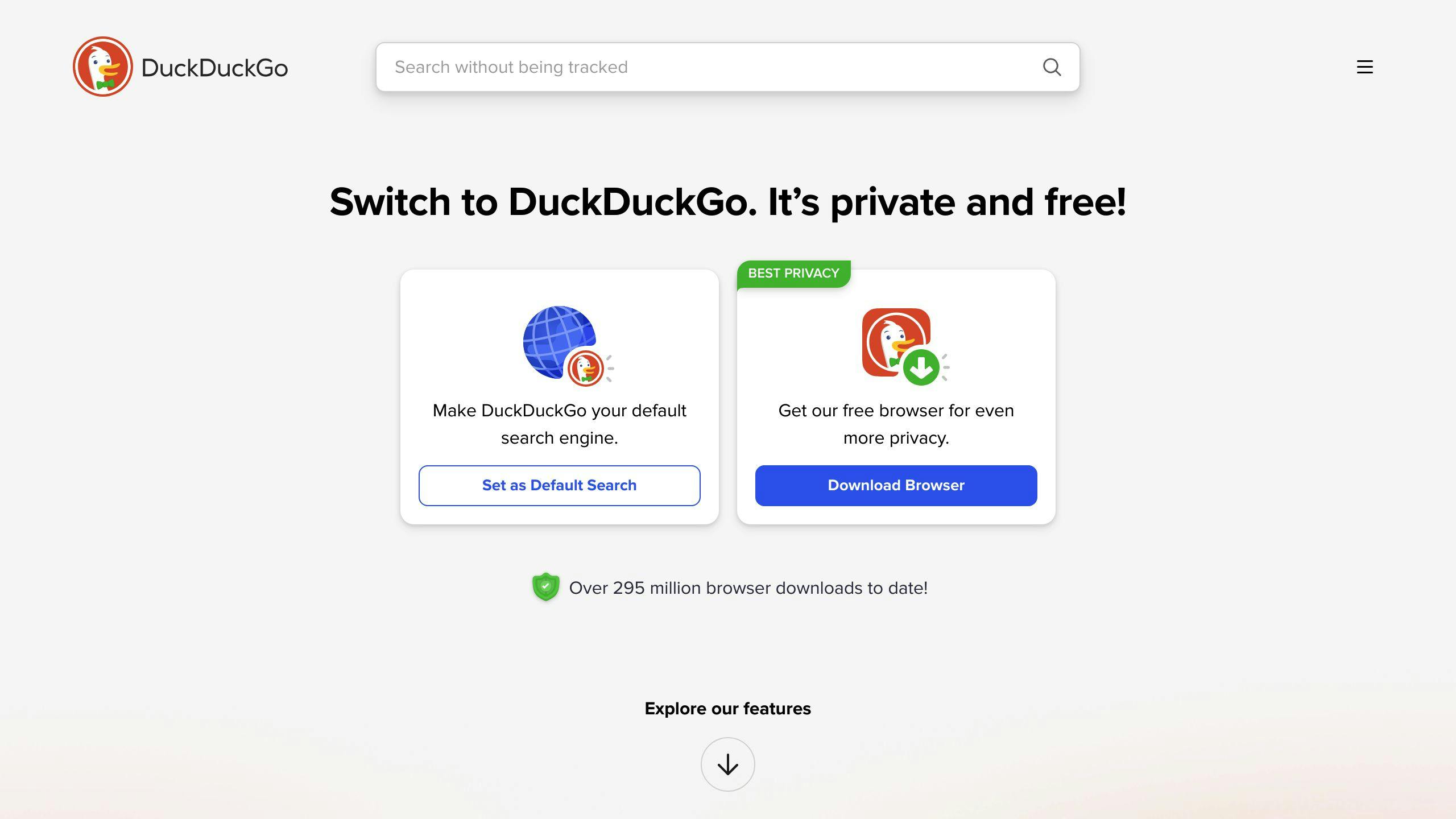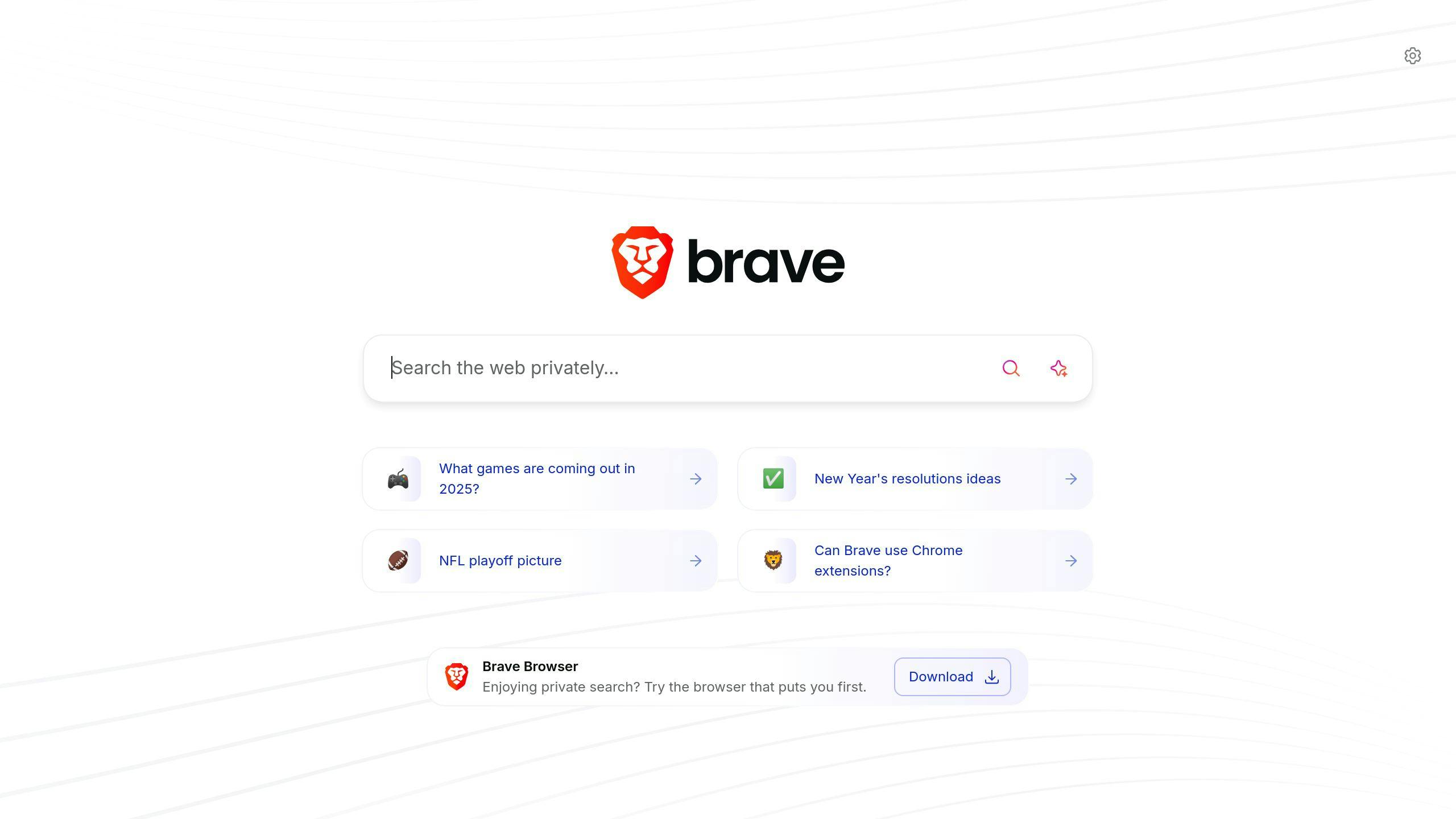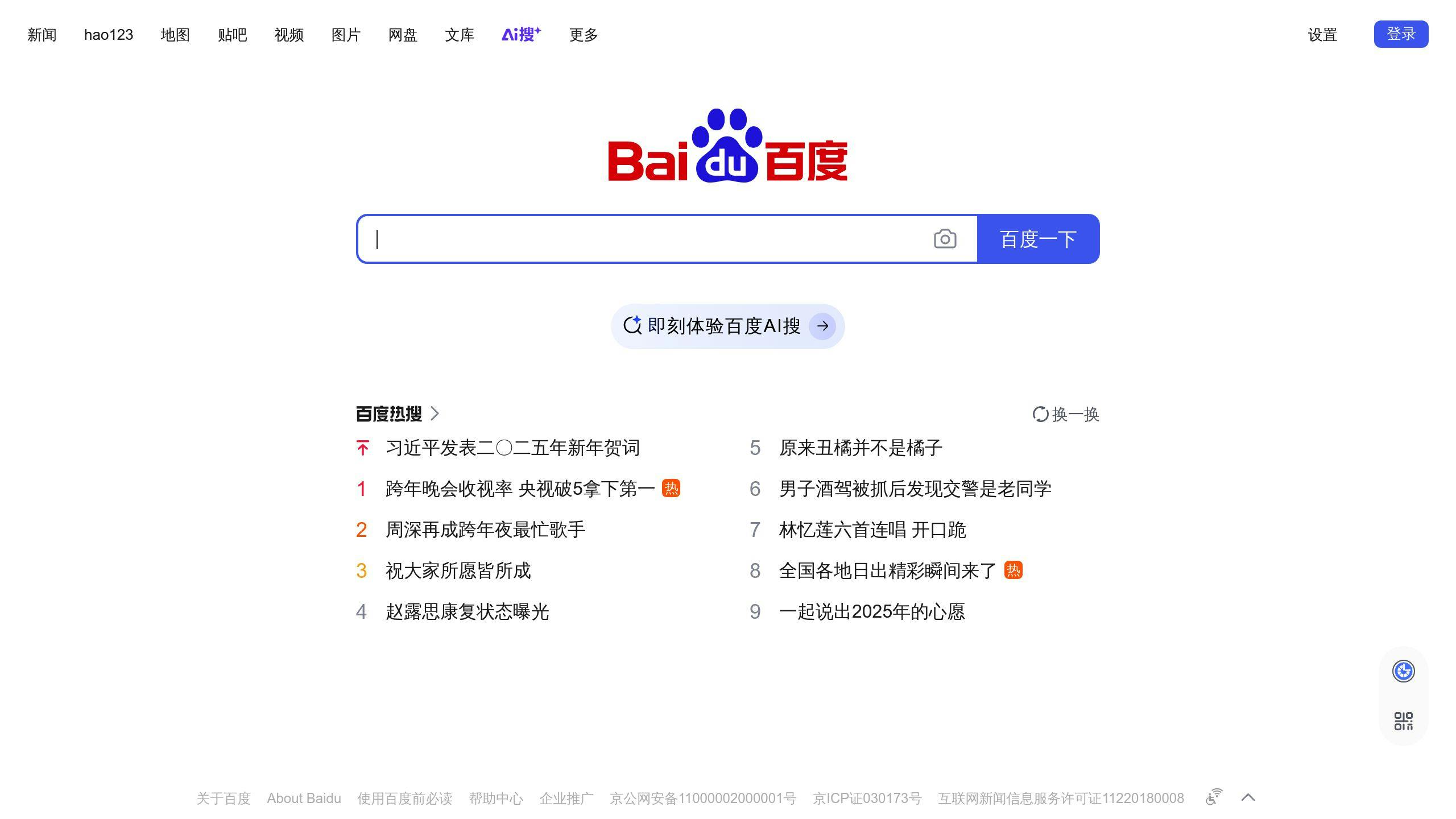- DuckDuckGo: Prioritizes privacy with no tracking and unbiased results. Features include Instant Answers, tracker blocking, and optional VPN tools.
- Brave Search: Uses its own independent index for unbiased results. Focuses on privacy with no data tracking or targeted ads.
- Bing: Integrated with Microsoft tools, offers rewards, advanced image/video search, and a privacy dashboard.
- Baidu: Dominates the Chinese market with strong AI features and exceptional support for Chinese-language queries.
- Yandex: Russia’s top search engine, tailored for Russian content with tools like Yandex Disk and advanced translation.
Quick Comparison
| Search Engine | Privacy Level | Key Features | Best For |
|---|---|---|---|
| DuckDuckGo | Very High | No tracking, encrypted searches | Privacy-conscious users |
| Brave Search | High | Independent index, AI answers | Users seeking private, unbiased results |
| Bing | Moderate | Microsoft integration, rewards | Professionals using Microsoft tools |
| Baidu | Standard | AI features, Chinese content focus | Users targeting Chinese-language content |
| Yandex | Standard | Russian tools, local expertise | Russian content and regional searches |
Choose based on your priorities: privacy, regional focus, or advanced tools.
The End of Google Search? Testing PRIVATE Alternatives
1. DuckDuckGo

DuckDuckGo is a go-to choice for anyone prioritizing privacy in their online searches. This search engine is built around a strict no-tracking policy, actively blocking hidden trackers and pop-ups. This not only protects your search history and personal data but also speeds up browsing [2][4].
DuckDuckGo isn't just about privacy - it also offers helpful tools to make searching easier. Features like Instant Answers deliver quick facts at the top of search results, often pulling reliable information from sources like Wikipedia [2]. Other handy tools include Bang Search Shortcuts for direct site access, Global Privacy Control to limit data sharing, and built-in utilities like calculators and weather updates.
For users seeking even more security, DuckDuckGo Privacy Pro adds extras like VPN services and tools to remove data from brokers [6]. While it doesn’t have Google’s ecosystem, DuckDuckGo’s ad-free, unbiased results make it a great choice for those avoiding targeted advertising [2][4].
Though DuckDuckGo shines in privacy, alternatives like Brave Search take a different route by focusing on independent indexing alongside privacy, offering users another solid search option.
2. Brave Search

Brave Search stands out by using its own independent web index, setting it apart from search engines that depend on data from major players like Google or Bing [1][3]. This approach guarantees search results that are free from the influence of large tech companies. Plus, Brave Search prioritizes user privacy with no tracking, no targeted ads, and no selling of data to third parties [1].
By January 2025, Brave Search had grown to over 340 million monthly visits, with more than half of its users accessing the platform via mobile devices [3]. This growth highlights how privacy-focused services can succeed while using non-intrusive, contextual ads based solely on search queries - not personal data - for monetization [5].
Some standout features include:
- Independent web crawling and indexing: No reliance on external search engines.
- Unbiased search results: Results are delivered without external filtering or influence.
- Integration with the Brave browser: A seamless experience for Brave users.
For those who value privacy and independence, Brave Search offers a strong alternative to mainstream search engines. While it doesn’t have the extensive service ecosystem of Google, its commitment to transparency and user control appeals to people who want a secure and private search experience [1][3].
Brave Search reflects the increasing demand for tools that give users more control over their online experience, offering a practical way to move away from traditional search engines without losing access to quality results.
3. Bing
Bing stands out as a strong alternative to Google, offering deep integration with the Microsoft ecosystem. As of 2023, it holds an 8.5% global market share [5], making it the second-largest search engine worldwide and handling billions of searches each month [1].
One of Bing's standout features is Entity Search, which provides detailed information on people, places, and things. In some cases, it even surpasses Google's Knowledge Graph in terms of depth [1]. Bing also uses AI to enhance conversational search, making interactions smarter and more intuitive. For those concerned about privacy, Microsoft's privacy dashboard allows users to adjust settings for ad targeting and search history [1][2].
Bing strikes a balance between advanced features and moderate privacy controls, making it a great option for users who value functionality. Its seamless integration with Microsoft tools like Office 365, Outlook, and Teams makes it especially appealing for professionals [1].
| Feature | Benefit |
|---|---|
| Bing Rewards | Earn points for searches, redeemable for gift cards |
| Microsoft Integration | Works seamlessly with Microsoft tools and services |
| Entity Search | Provides detailed information on specific topics |
| Local Search | Strong mapping and business listing features |
For businesses and content creators, Bing offers webmaster tools similar to Google Search Console. These tools help website owners track SEO performance and optimize their sites for Bing's algorithm, which places a higher emphasis on user behavior and social signals [1].
Bing also shines in image and video search, often delivering better results than Google in these areas [1]. For those looking for a mainstream alternative to Google, Bing combines powerful search capabilities with the added benefits of the Microsoft ecosystem.
4. Baidu

Baidu holds a commanding position in the Chinese search market, with around 80% market share as of 2023 [5]. It’s the go-to choice for users looking for Chinese-language content and services. Powered by advanced AI, Baidu’s search engine is designed to deliver precise results, especially for queries in Chinese.
Baidu combines its search functionality with services like Maps, Encyclopedia, and Translate. These tools, paired with features like voice search and image recognition, create a smooth and localized experience for Chinese users.
| Feature | Description |
|---|---|
| Language Processing | Exceptional understanding of Chinese language and context |
| Integration | Direct links with WeChat, Baidu Cloud, and Baidu Wallet |
| AI Features | Advanced capabilities in voice search and image recognition |
| Local Services | Extensive coverage of Chinese businesses and locations |
For businesses looking to tap into the Chinese market, Baidu offers an edge with its advertising platform and SEO tools. However, it’s important to note that Baidu adheres to China's data regulations, which differ significantly from Western privacy practices.
"Baidu is not just a search engine; it's a gateway to understanding China's digital landscape." - Robin Li, Co-founder and CEO of Baidu [6]
Baidu’s strength lies in its ability to process Chinese-language queries and multimedia content, making it stand out from other search engines. While it’s highly effective for Chinese-language searches and local content, its reach outside China is more limited compared to Google. Another noteworthy feature is Baidu Zhidao, a Q&A platform that provides insights on topics relevant to the Chinese audience.
For users interested in regional alternatives for Russian-language content, Yandex might be worth exploring.
5. Yandex
Yandex is Russia's top search engine, holding a 60% market share [5]. It goes beyond basic search by offering services specifically designed for Russian-speaking users and regional preferences. This focus gives it a competitive edge over global platforms in its niche.
| Feature | Functionality |
|---|---|
| Language Processing | Handles Russian syntax and context with precision |
| Local Services | Offers maps, weather updates, and business directories for Russian regions |
| Translation Tools | Provides Russian-specific translation features |
| Privacy Options | Includes a Private Search mode with history deletion and reduced ad targeting |
Yandex also includes tools like Yandex Disk for cloud storage, advanced mapping, and translation services tailored to Russian users. Its strength lies in proprietary algorithms built to interpret Russian language structures and user habits [3].
For users concerned about privacy, Yandex offers a Private Search mode. This feature allows users to erase their search history and minimize ad targeting [1][2]. However, Yandex collects more data compared to privacy-focused competitors like DuckDuckGo.
"Yandex is more than just a search engine; it's a gateway to Russian internet culture." - Andrey Volozh, Co-founder of Yandex [7]
Yandex stands out in several areas:
- Finding Russian-language content and regional insights
- Accessing detailed local business and service directories
- Using specialized search categories for images, videos, and news
- Conducting targeted searches in industries like real estate and tourism [3]
For those exploring Russian-language content or regional information, Yandex is an essential tool. While it might not be the go-to option for global searches, its specialized features make it unmatched in its home market.
The following section will dive into global and privacy-focused search engine alternatives. Stay tuned!
Advantages and Disadvantages
Every alternative search engine comes with its own strengths and limitations, making it easier for users to choose the one that fits their needs best.
Here's a quick comparison of the main features, drawbacks, and ideal use cases for some popular search engines:
| Search Engine | Key Advantages | Key Disadvantages | Best For |
|---|---|---|---|
| DuckDuckGo | • No tracking policy • Unfiltered results • Built-in tracker blocking |
• Limited personalization • Smaller index size |
Users focused on privacy and unbiased search results |
| Brave Search | • Independent web crawler • No personal data collection • No targeted ads |
• Newer platform • Features still evolving |
Users wanting a secure, independent search experience |
| Bing | • Wide toolset • Advanced image search • Microsoft product integration |
• Smaller user base • Results can lack refinement |
Professionals using Microsoft tools |
| Baidu | • Strong presence in China • Local service integration • Expertise in regional content |
• Limited global reach • Language barriers |
Those researching or creating Chinese content |
| Yandex | • Specializes in Russian language • Regional service integration • Advanced translation tools |
• Collects more user data • Limited outside Russia |
Russian content creators and marketers |
DuckDuckGo stands out for its strict privacy policies, offering consistent, unbiased results without tracking users [5]. Brave Search also focuses on privacy but takes it a step further with its independent web crawler, ensuring diverse and secure search results [1][3].
For regional expertise, Yandex and Baidu dominate in their respective markets, providing tailored services and content for Russian and Chinese audiences. On the other hand, Bing offers a balance between Google's features and alternative tools, making it a great option for users already in the Microsoft ecosystem [1].
When deciding on a search engine, think about what matters most to you - whether it's privacy, regional content, or specific features. Pairing privacy-focused search engines with tools like VPNs can add an extra layer of security [4].
Knowing the strengths and weaknesses of these options can help you find the best fit for your needs, whether you're prioritizing anonymity, regional expertise, or advanced tools.
Conclusion
As online search continues to evolve, more options are emerging to challenge Google's dominance. These alternatives cater to various needs, whether it's prioritizing privacy, addressing regional demands, or offering specialized features.
For those focused on privacy, platforms like DuckDuckGo stand out with features such as tracker blocking and encrypted connections, ensuring user data stays secure [5]. Similarly, Brave Search provides independent web crawling and privacy-first tools, appealing to users aiming to avoid Google's ecosystem [1][3]. On the other hand, Bing integrates seamlessly with Microsoft's suite of tools, making it a convenient choice for users already in the Microsoft ecosystem.
In regions like China and Russia, localized search engines such as Baidu and Yandex excel by tailoring content to specific languages and cultural needs [5]. These platforms are designed to serve their local audiences more effectively than global search engines.
When deciding on an alternative, think about what matters most to you:
- Concerned about privacy? DuckDuckGo or Brave Search are great picks.
- Need regional expertise? Baidu or Yandex deliver unmatched local insights.
- Looking for advanced tools and integration? Bing offers a well-rounded option.
Each search engine brings its own strengths and limitations. You might even consider using multiple platforms to suit different needs - for example, DuckDuckGo for private searches and Bing for work-related tasks that benefit from Microsoft's ecosystem.
Ultimately, the right choice depends on your priorities. By aligning your needs with the strengths of these alternatives, you can create a more personalized and effective search experience.
FAQs
What is the best alternative to Google search?
The best alternative depends on what you're looking for. Here’s a quick breakdown of top options and their strengths:
- Privacy-Focused: DuckDuckGo is known for its no-tracking policy and encrypted searches, making it a go-to for users who value privacy above all else [2][4].
- Independent Results: Brave Search offers results from its own index, ensuring less bias while combining privacy with AI-powered answers [1][3].
- Microsoft Integration: Bing works seamlessly with Microsoft tools and is packed with features designed for business professionals [1].
- Regional Expertise: Yandex and Baidu specialize in Russian and Chinese content, respectively, catering to users in those regions with tailored tools [5].
Here’s a quick comparison to help you decide:
| Search Engine | Privacy Level | Key Features | Best For |
|---|---|---|---|
| DuckDuckGo | Very High | No tracking, encrypted searches | Privacy-conscious users |
| Brave Search | High | Independent index, AI answers | Tech-savvy individuals |
| Bing | Moderate | Microsoft integration, features | Business professionals |
| Yandex | Standard | Regional tools, local expertise | Users needing local content |
Switching from Google doesn’t have to be all at once. Try out these alternatives based on your top priorities, whether it’s protecting your data, accessing regional tools, or exploring new features [2][4].
These options show how search engines are evolving, giving users more freedom and control over their online experience [1][3].








